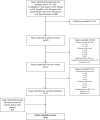mHealth Interventions To Support Self-Management In HIV: A Systematic Review
- PMID: 29290888
- PMCID: PMC5730953
- DOI: 10.2174/1874613601711010119
mHealth Interventions To Support Self-Management In HIV: A Systematic Review
Abstract
Background: Self-management is an important aspect of long-term HIV treatment. Mobile technologies offer the potential to efficiently deliver interventions to facilitate HIV self-management. The last comprehensive review of such mHealth interventions was conducted in 2011. Given the rapidly evolving field, a need was identified for an updated review of the literature.
Objective: The study aimed to describe and evaluate current evidence-based mHealth interventions to support self-management in HIV.
Method: Eight online databases (Medline, Scopus, Embase, PsycINFO, Cochrane, Global Health CAB, IEEE explore, Web of Science) were systematically searched for papers describing and evaluating mHealth HIV self-management interventions. Reference lists of relevant papers were also searched. Data on intervention content and evaluation methodology were extracted and appraised by two researchers.
Results: 41 papers were identified evaluating 28 interventions. The majority of these interventions (n=20, 71%) had a single focus of either improving adherence (n=16), increasing engagement in care (n=3) or supporting smoking cessation (n=1), while just 8 (29%) were more complex self-management interventions, targeting a range of health-related behaviours. Interventions were predominantly delivered through SMS messaging. They significantly impacted on a range of outcomes including adherence, viral load, mental health and social support.
Conclusion: Since the last major review of mHealth interventions in HIV, there has been a shift from exploratory acceptability/feasibility studies to impact evaluations. While overall the interventions impacted on a range of outcomes, they were generally limited in scope, failing to encompass many functions identified as desirable by people living with HIV. Participant incentives may limit the generalizability of findings.
Keywords: HIV treatment; Information technology; Mobile phone; Self-management; mHealth.
Figures
References
-
- Lundgren J.D., Babiker A.G., Gordin F., Emery S., Grund B., Sharma S., Avihingsanon A., Cooper D.A., Fätkenheuer G., Llibre J.M., Molina J.M., Munderi P., Schechter M., Wood R., Klingman K.L., Collins S., Lane H.C., Phillips A.N., Neaton J.D. INSIGHT START Study Group. Initiation of antiretroviral therapy in early asymptomatic HIV infection. N. Engl. J. Med. 2015;373(9):795–807. doi: 10.1056/NEJMoa1506816. - DOI - PMC - PubMed
-
- Zwahlen M., Harris R., May M., Hogg R., Costagliola D., de Wolf F., Gill J., Fätkenheuer G., Lewden C., Saag M., Staszewski S., d’Arminio Monforte A., Casabona J., Lampe F., Justice A., von Wyl V., Egger M. Antiretroviral Therapy Cohort Collaboration. mortality of HIV-infected patients starting potent antiretroviral therapy: comparison with the general population in nine industrialized countries. Int. J. Epidemiol. 2009;38(6):1624–1633. doi: 10.1093/ije/dyp306. - DOI - PMC - PubMed
-
- May M.T., Gompels M., Delpech V., Porter K., Orkin C., Kegg S., Hay P., Johnson M., Palfreeman A., Gilson R., Chadwick D., Martin F., Hill T., Walsh J., Post F., Fisher M., Ainsworth J., Jose S., Leen C., Nelson M., Anderson J., Sabin C. UK Collaborative HIV Cohort (UK CHIC) Study. Impact on life expectancy of HIV-1 positive individuals of CD4+ cell count and viral load response to antiretroviral therapy. AIDS. 2014;28(8):1193–1202. doi: 10.1097/QAD.0000000000000243. - DOI - PMC - PubMed
-
- Guaraldi G., Prakash M., Moecklinghoff C., Stellbrink H.J. Morbidity in older HIV-infected patients: impact of long-term antiretroviral use. AIDS Rev. 2014;16(2):75–89. - PubMed
Publication types
LinkOut - more resources
Full Text Sources
Other Literature Sources
Medical

